Introduction to Internal Auditing and Management Training
Quantity: 1

Duration 3 hours
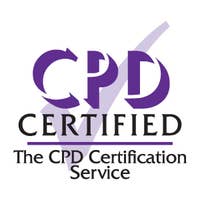

100% online training
Start when you like
Learn on any device (desktop, mobile or tablet)
Instant assessment and result
1 learner per course
Train teams of all sizes
Bulk discounts starting at 10% off 10 courses
Pay by invoice with 30 day payment terms available (5+ courses)
Includes a 10% discount for 10+ courses
This Introduction to Internal Auditing and Management Training course will help those working in food manufacturing identify areas which should be internally audited and have the skills to implement effective internal auditing procedures. Insufficient internal auditing procedures and risk assessments are one of the most common causes of a non-conformance in an external audit. This course will teach you how to maintain, monitor and continuously improve current systems - as well as how to investigate the root cause of a non-conformance, the effectiveness of the corrective and preventative actions, and what is involved in traceability exercises.
This course will help a food business operator comply with internal audit requirements within industry standards, such as GFSI standards and SALSA. By the end of this course, you will feel secure in your knowledge of the purpose of internal auditing and why it is important, have an understanding of a risk-based approach to internal auditing, know the roles and responsibilities of an internal auditor and understand what is involved in setting up an internal audit system, checklist and plan. Once learnt, these skills can be applied to any procedure or process you may have.
100% online training
Access anywhere
Same day digital certificate
Printed certificate posted next working day
Full audio voiceover
Assessment retakes at no extra cost
Developed by food safety professionals and Reviewed by an independent lead auditor
Accredited by CPD
Ensures compliance with SALSA and GFSI industry standards
Bulk discount for orders of 10+ courses
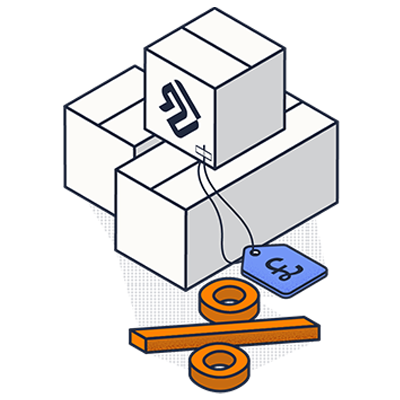
Save on our courses when you buy more training upfront. Lock in a better price now and access the training whenever you need to. You can mix and match any of our courses too and get the discount off your whole order.
10+ courses = 10% off
50+ courses = 20% off
100+ courses = 30% off
500+ courses = 40% off
By the end of this course, you will:
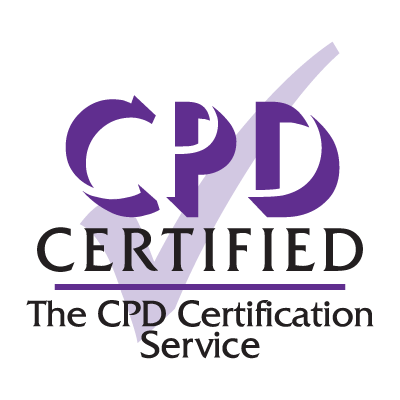
Accredited by CPD
All of our courses are accredited by the CPD Certification Service as conforming to universally accepted Continuing Professional Development (CPD) guidelines.
Recommended renewal:
3 years
What does this mean? This certificate does not have an expiry date, however, based on industry best practice guidelines there is a recommended renewal period.
Our in-house Learning Designers develop all of our courses to give you and your learners the most engaging training possible.
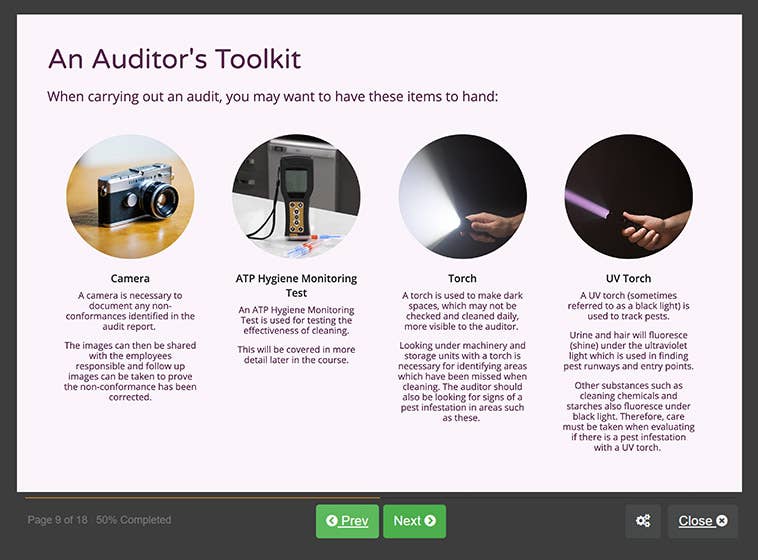
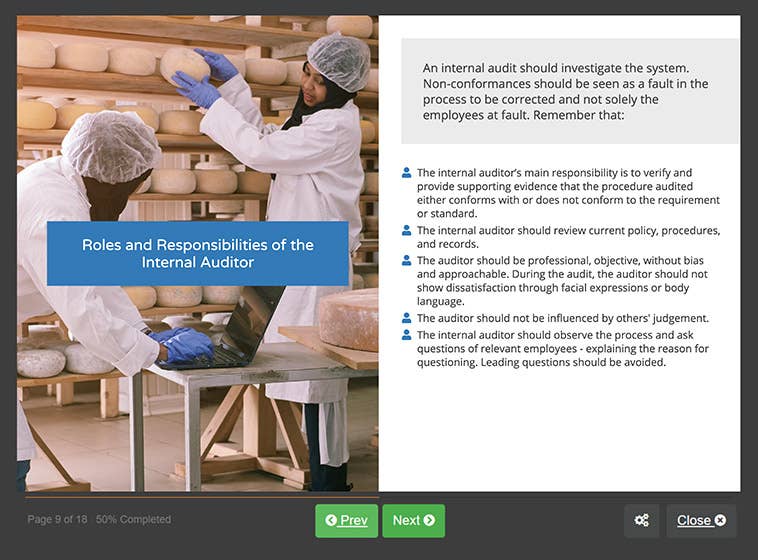
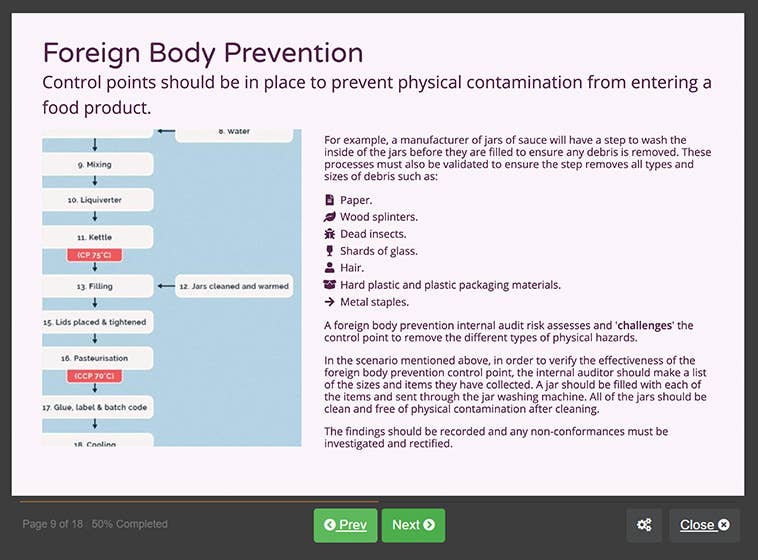
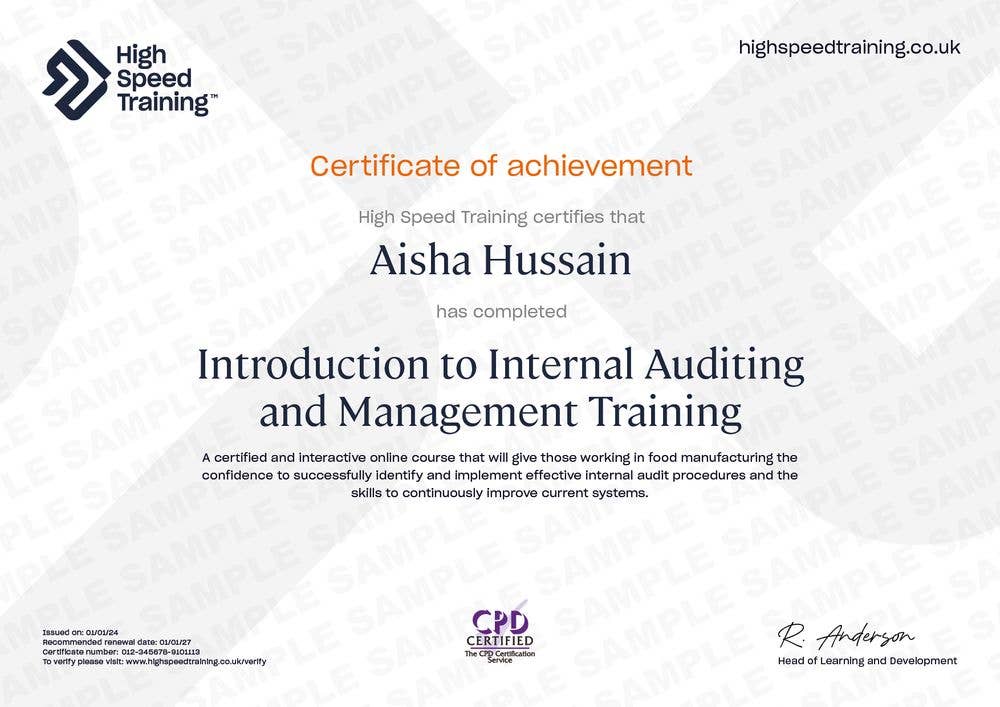




What is an internal audit?, who is involved in an internal audit?, the benefits of internal auditing, legislation, industry standards, 3 lines of defence, maintaining current systems, monitoring current systems, continuous improvement of current systems, a risk based approach, an auditor's toolkit.
Key things to internally audit, frequency of auditing, creating an audit schedule, creating an audit checklist against standards, preparing for an internal audit, conducting an effective internal audit, roles and responsibilities of the internal auditor.
Evaluation of the objective evidence, investigating different types of non-conformances, root cause analysis, writing non-conformance reports, corrective actions and verifying the effectiveness of corrective actions, communication.
The importance of traceability, scope of a traceability exercise, one step forward, one step back, good traceability practices, mock recall, supplier audits, defining a batch, bulk storage, key contact testing, crisis management.
Audit interviews, ATP hygiene monitoring tests, cleaning in Place (CIP), physical hazards - the 6 P's, foreign body detection and prevention, glass & hard plastics audit, hygiene and fabrication, thermal process validation, verification of Critical Control Points, TACCP & VACCP, food fraud, claims.
Regulatory compliance, quality control, packaging quality checks, prerequisites & GMP, training plans, legionella and water testing, waste review, cyber security, hand washing, food safety culture & whistleblowing, complaints database auditing, storage and distribution, health & safety and maintenance, HACCP document validation, validating flow charts, high-risk foods and groups of people.
The online assessment is taken on completion of the training material. You will be asked 30 multiple choice questions with a pass mark of 80%. The answers are marked automatically so you will instantly know whether you have passed. If you don’t pass, don't worry! You can take the test as many times as you need with no extra charge.
This Introduction to Internal Auditing and Management course is suitable for anyone who works in the food manufacturing industry, preferably with prior HACCP knowledge. It can be taken by those with no internal audit experience, anyone wanting to refresh their internal audit knowledge and individuals who would like an awareness of internal auditing. This certified online training is ideal for people working in positions such as, but not limited to:
Quantity: 1